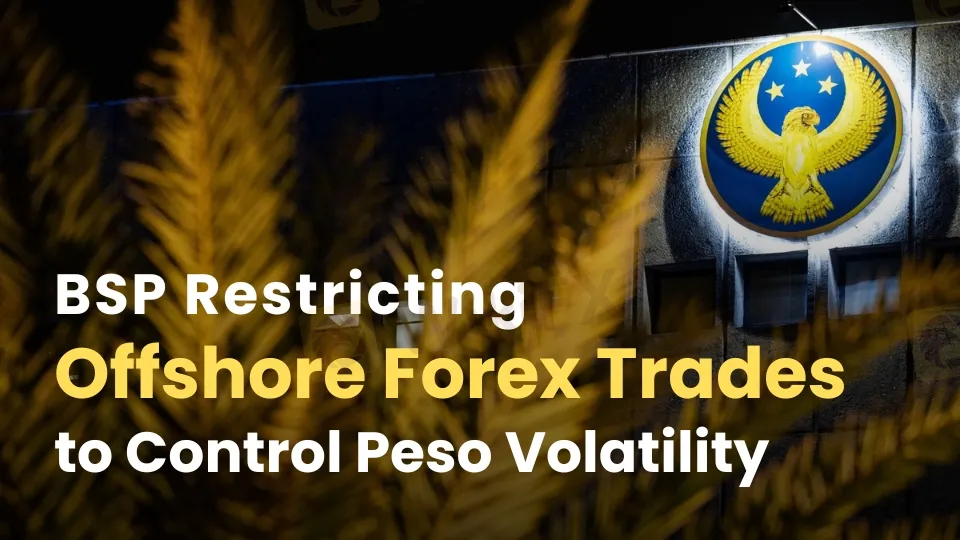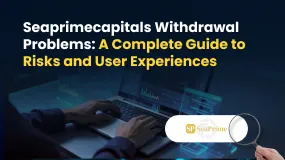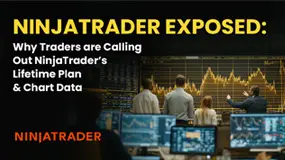简体中文
繁體中文
English
Pусский
日本語
ภาษาไทย
Tiếng Việt
Bahasa Indonesia
Español
हिन्दी
Filippiiniläinen
Français
Deutsch
Português
Türkçe
한국어
العربية
BSP Restricting Offshore Forex Trades to Control Peso Volatility
Abstract:BSP tightens rules on offshore forex trades, including NDFs, to reduce systemic risks and peso volatility. Stakeholders’ feedback due by March 26.

The Bangko Sentral ng Pilipinas (BSP) is making strong moves to limit banks' offshore FX trading activity. What's the goal? To protect the peso from extreme fluctuations and prevent speculative trading from adding to systemic vulnerabilities in the financial system. With the peso's stability hanging in the balance, the BSP is pressing for stricter regulations, and stakeholders have until March 26, 2025, to comment on a draft circular that might change how banks manage currency operations involving non-deliverable forwards (NDFs).
So, what is an NDF? It is a contract in which two parties agree to purchase or sell foreign currency at a predetermined price, but rather than exchanging actual cash later, they settle the value difference when the agreement matures. It's an effective way for firms, particularly importers, to hedge against FX volatility. But here's the catch: the BSP believes certain banks aren't only deploying NDFs to safeguard customers. They may also be speculating on peso movements to make a profit, which might backfire and undermine the currency.
History supports the BSP's fears. Excessive NDF trading has previously inflated the peso's value, complicating attempts to maintain stable exchange rates. When the peso rises against the dollar, exporters and families that rely on remittances from overseas Filipino workers suffer financially. That is why the BSP has tightened NDF restrictions throughout the years, and the most recent proposal is no exception.

The proposed circular does not end at NDFs. It also includes other forex derivatives such as non-deliverable swaps (NDS) and non-deliverable cross-currency swaps (NDCCS). In an NDS, no actual currency is swapped; instead, compensation is based on the difference between the agreed-upon rate and the market rate. NDCCS goes a step further, resolving currency and interest rate disparities without affecting cash flows. The BSP wants these “variants” subject to the same tight control as NDFs, including bank limitations and greater capital requirements.
Once the circular is approved, peso NDS and NDCCS trades will be capped at 20% of qualifying capital for local banks and 100% for international branches. However, trades with the BSP will not count toward these restrictions. “To mitigate the buildup of systemic risks and protect against undue concentration in market usage, the prudential guidelines are set in place,” the proposed regulation states. It's a clear statement that the BSP isn't playing around when it comes to FX speculation.
This is more than simply statistics; it's about keeping the economy stable. Peso volatility affects everyone in the Philippines, not just banks. Exporters lose competitiveness, while households who rely on dollar remittances see their budgets dwindle. By cracking down on hazardous FX trading, the BSP seeks to avoid similar hassles and prevent systemic risks from snowballing.
With the March 26 deadline approaching, the stakes are high. Banks, dealers, and corporations are looking over the plan, aware that it might alter their FX strategy. For the time being, the BSP is acting as a watchdog, trying to prevent speculative transactions from destabilizing the peso and the wider financial system. Will this work? Only time will tell, as will the peso's next move.

Disclaimer:
The views in this article only represent the author's personal views, and do not constitute investment advice on this platform. This platform does not guarantee the accuracy, completeness and timeliness of the information in the article, and will not be liable for any loss caused by the use of or reliance on the information in the article.
Read more

Seaprimecapitals Withdrawal Problems: A Complete Guide to Risks and User Experiences
Worries about Seaprimecapitals withdrawal problems and possible Seaprimecapitals withdrawal delay are important for any trader. Being able to get your money quickly and reliably is the foundation of trust between a trader and their broker. When questions come up about this basic process, it's important to look into what's causing them. This guide will tackle these concerns head-on, giving you a clear, fact-based look at Seaprimecapitals' withdrawal processes, user experiences, and trading conditions. Most importantly, we'll connect these real-world issues to the single most important factor behind them: whether the broker is properly regulated. Understanding this connection is key to figuring out the real risk to your capital and making a smart decision.

iFX Brokers Review: Do Traders Face Withdrawal Issues, Deposit Credit Failures & Free Coupon Mess?
Have you had to pay several fees at iFX Brokers? Had your trading profit been transferred to a scamming website, causing you losses? Failed to receive withdrawals from your iFX Brokers trading account? Has your deposit failed to reflect in your trading account? Got deceived in the name of a free coupon? Did the broker officials not help you in resolving your queries? Your problems resonate with many of your fellow traders at iFX Brokers. In this iFX Brokers review article, we have explained these problems and attached traders’ screenshots. Read on!

NinjaTrader Exposed: Why Traders are Calling Out NinjaTrader’s Lifetime Plan & Chart Data
Did NinjaTrader onboard you in the name of the Lifetime Plan, but its ordinary customer service left you in a poor trading state? Do you witness price chart-related discrepancies on the NinjaTrader app? Did you have to go through numerous identity and address proof checks for account approval? These problems occupy much of the NinjaTrader review online. In this article, we have discussed these through complaint screenshots. Take a look!

Vietnam Forex Fraud Kingpin Arrested in Philippines
Vietnam forex fraud suspect Le Khac Ngo arrested in Philippines as authorities uncover record-breaking cross-border investment scam.
WikiFX Broker
Latest News
Bessent believes there won't be a recession in 2026 but says some sectors are challenged
Currency Calculator



